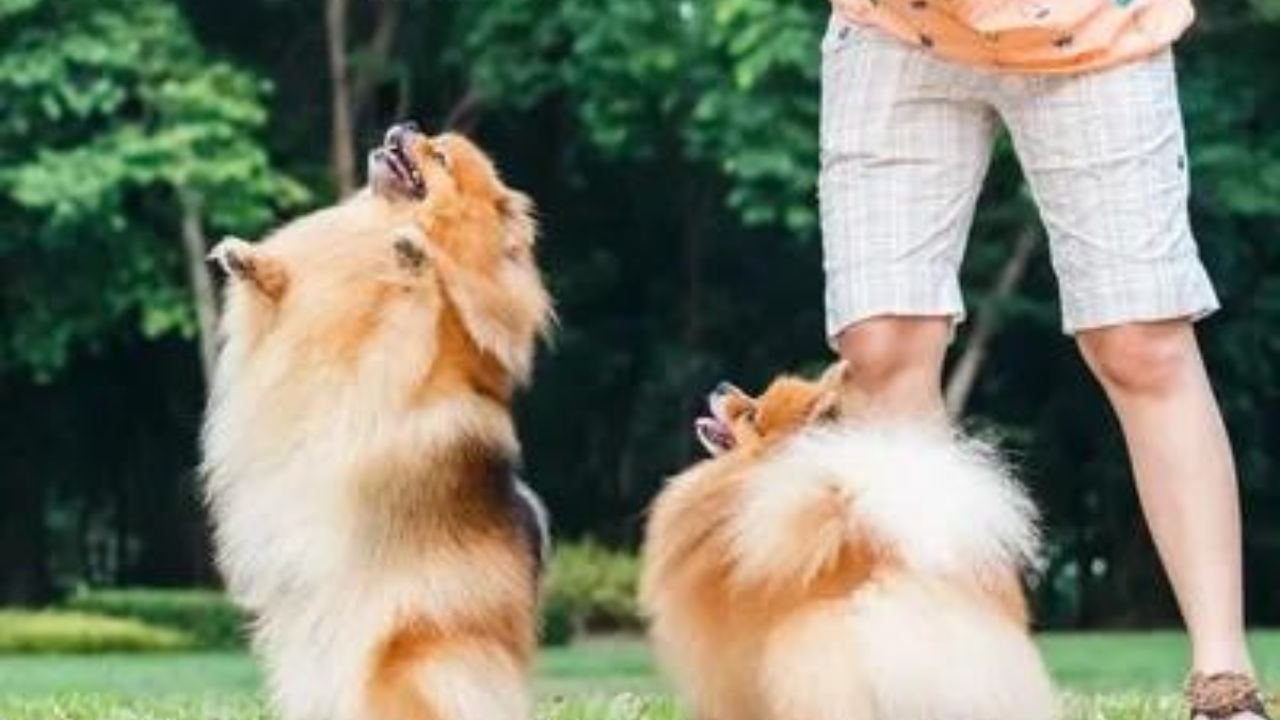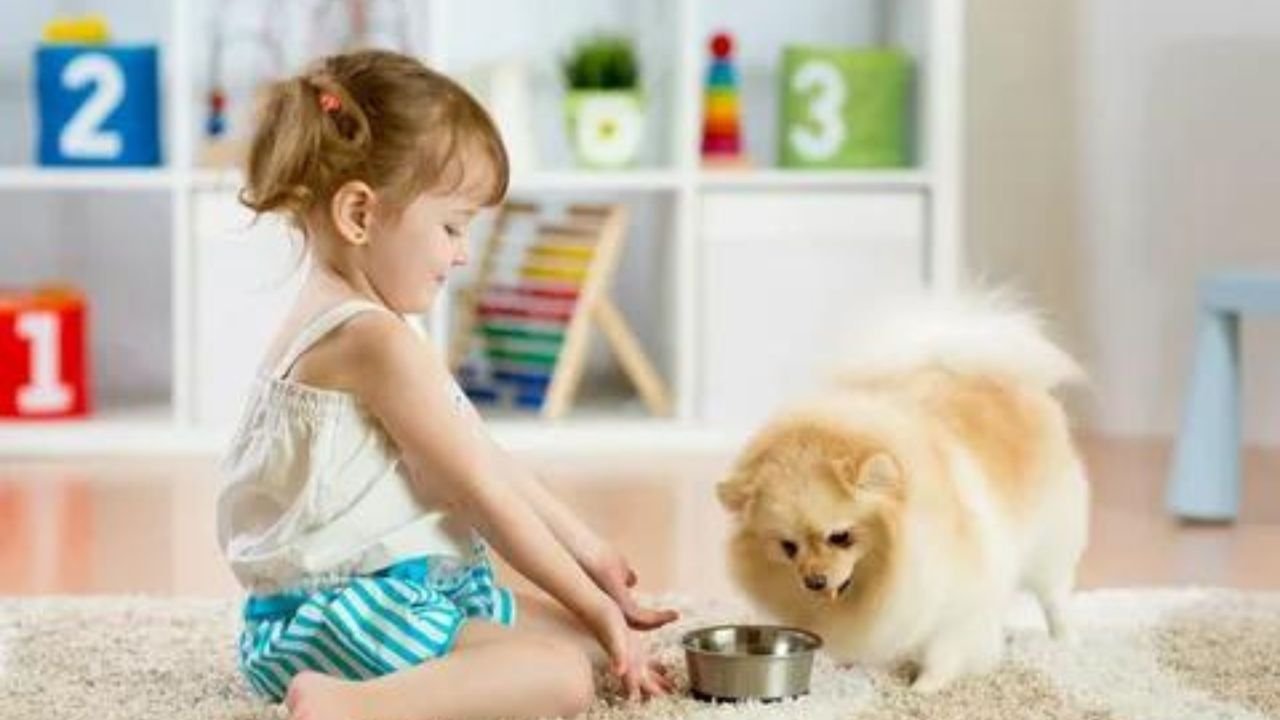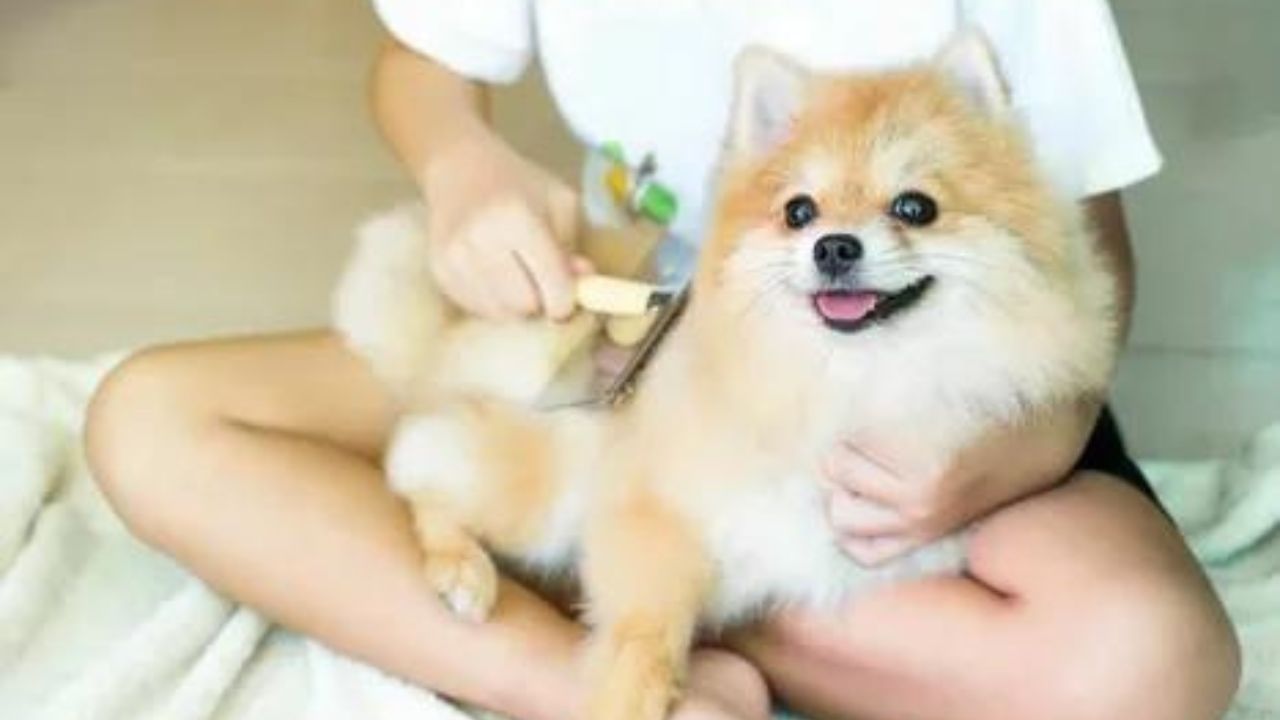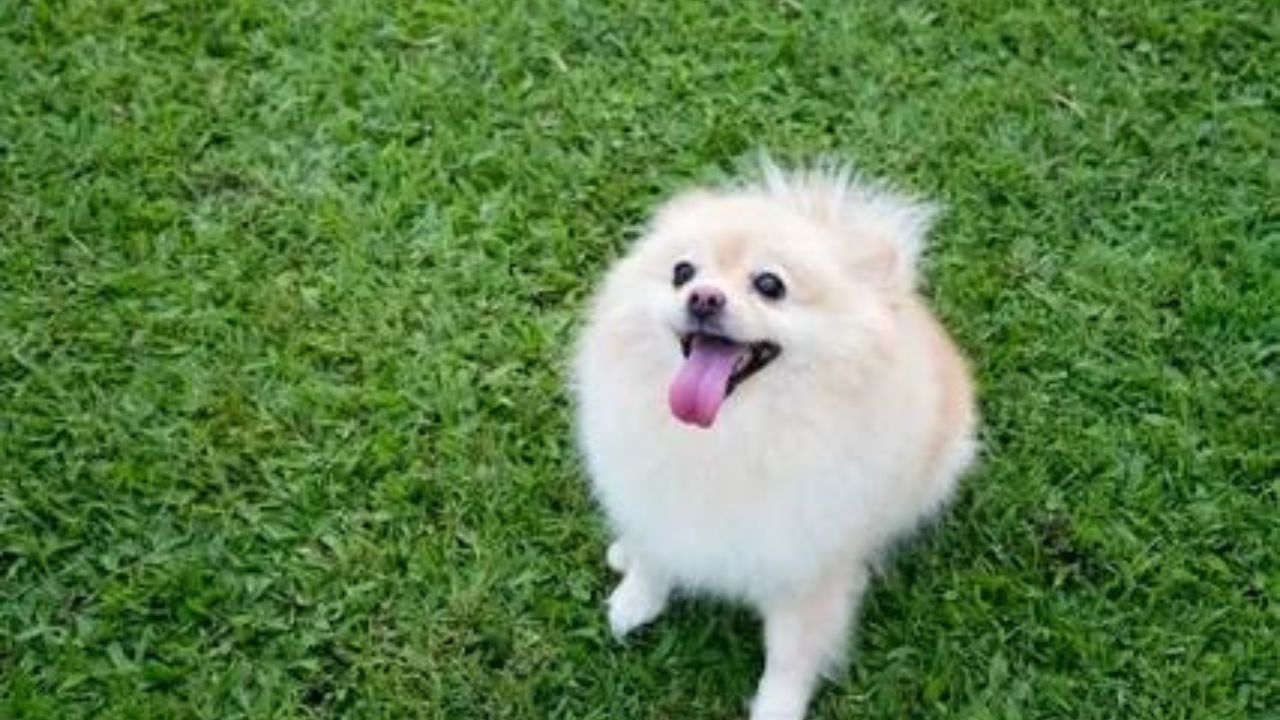Pomeranians are known for their adorable appearance and playful personalities. If you’ve recently welcomed a Pomeranian puppy into your home, potty training is one of the essential tasks you’ll need to tackle. Teaching your Pomeranian to use the designated bathroom area will keep your house clean and establish good habits for your furry friend. In this article, we will provide a comprehensive guide on potty training a Pomeranian puppy effectively.
Complete Pomeranian House Training Information

Owners must understand that housetraining a Pomeranian requires patience and perseverance in the first weeks. If you purchased your Pom puppy from a reputable, registered show breeder, your task will be much easier.
Pomeranian potty training troubles usually arise with multiple puppies born and reared in dirty conditions. Most Pomeranian show dog breeders will commence to potty train Pomeranian puppies with training pads, newspapers, or a litter tray.
Your Pomeranian’s Needs
Before diving into the specifics of potty training, it’s important to understand your Pomeranian’s needs and behaviour. Pomeranians are small dogs with a high metabolism, so they may need to relieve themselves more frequently than larger breeds. Additionally, puppies generally have less control over their bladder and bowel movements, making consistent training crucial.
An Important Part of Pomeranian Potty training is:
- As soon as the puppy wakes up, I take him outside to the area I want him to use as a potty area.
- After the puppy has been to the toilet, let him run around your house.
- Watch carefully for any indications that your puppy needs to go outside to the potty area.
Establish a Routine
Creating a consistent routine is key to successful potty training. Start by setting specific times for your Pomeranian puppy to eat, drink, play, and go outside. Puppies must be eliminated shortly after meals and after waking up from naps. By following a schedule, you can anticipate when your Pomeranian will need to go and ensure you are there to guide them to the appropriate area.
Pomeranian Potty Training Problems
Choose a Designated Bathroom Area
Select a designated bathroom area for your Pomeranian puppy. This could be a specific spot in your yard or an indoor pee pad for those living in apartments or areas with limited outdoor access. The key is to choose an easily accessible area that your puppy can associate with going Potty. Use positive reinforcement, such as treats or praise, when your puppy eliminates in the designated spot to reinforce the desired behaviour.
Supervision and Crating
When Potty training your Pomeranian, it’s essential to supervise them closely, especially during the initial stages. Keep your puppy within sight to prevent accidents, and quickly redirect them to the designated bathroom area when necessary. Crate training can also be a valuable tool in potty training. Dogs generally avoid soiling their sleeping area, so using a properly sized crate for your Pomeranian can help control their urges and establish a routine.
Consistency and Positive Reinforcement
Consistency is key when potty training any dog, including Pomeranians. Reward your puppy with treats, praise, or even playtime immediately after they are successfully eliminated in the designated area. This positive reinforcement helps your puppy understand that they have done something right. Conversely, avoid scolding or punishing your puppy for accidents. Instead, calmly clean up the mess and continue with the training process.
Are Pomeranians Hard to Train?
Pomeranians are smart animals, so they can quickly pick up on new commands and behaviours. However, there’s more to the issue than just intelligence.
Part of the issue is that these little dogs have little bladders. As a result, they can’t go as long between bathroom breaks as some other breeds, so you’ll need to be on the spot with access to the outdoors or provide them with puppy pads or other owner-approved places to go.
Pomeranians can also be headstrong, so you need to be firm and consistent with your training. They respond best to positive reinforcement, so don’t punish them if they mess up, as that will only make your job harder.
The good news is that these pups are usually ready to be housetrained by about 8 weeks old, so you don’t have to wait long to start solving the problem. The only caveat is you’re training them to go outside. It would help if you waited until they’ve had all their shots, or else they could contract something like Parvo during the process.
Accident Management
Accidents may happen during the potty training process, so it’s important to handle them appropriately. If you catch your Pomeranian in eliminating an undesired area, interrupt them with a gentle noise or clap of hands and quickly guide them to the designated spot. Avoid using punishment or yelling, as it can create anxiety and hinder the training progress. Clean any accidents thoroughly with an odour-eliminating cleaner to remove lingering scent markers that may attract your puppy back to the same spot.
Patience and Persistence
Potty training takes time, patience, and persistence. While some Pomeranian puppies may catch on quickly, others may require more time to grasp the concept. Be prepared for setbacks and have realistic expectations. Stay consistent with the training routine and provide plenty of positive reinforcement to encourage your puppy’s progress.
Additional Tips for Potty Training a Pomeranian Puppy

Use verbal cues or commands: Along with a designated bathroom area, it can be helpful to establish a specific verbal cue or command for your Pomeranian puppy to associate with going Potty. For example, you can consistently use phrases like “Go potty” or “Do your business” when guiding your puppy to the designated spot. Over time, they will learn to associate the command with the action.
Monitor water intake: Controlling your Pomeranian puppy’s water intake can help regulate their need to go Potty. Provide fresh water at regular intervals throughout the day, but avoid always leaving it out. By monitoring their water intake and offering it strategically, such as after playtime or meals, you can anticipate when they are likely to need to be eliminated.
Take your Pomeranian outside frequently: During the initial stages of potty training, it’s essential to take your puppy outside frequently, even if they don’t show signs of needing to go. Aim for every 1-2 hours, especially after naps, meals, play sessions, or waking up in the morning. This proactive approach reduces the chances of accidents inside the house and reinforces the idea of going potty in the designated area.
Keep a consistent feeding schedule: Establishing a consistent feeding schedule for your Pomeranian puppy helps with overall health but also aids in potty training. Feed your puppy at the same times each day, ideally in smaller portions, to prevent overeating. By regulating their mealtimes, you can predict when they must be eliminated and plan accordingly.
Be patient during nighttime: Nighttime can pose a challenge during potty training, as puppies have less bladder control while sleeping. To minimize accidents, limit your Pomeranian puppy’s access to water a few hours before bedtime and take them out for a final potty break right before sleep. If your puppy wakes up during the night and appears restless, it may indicate the need to go outside.
Consider using pee pads: Pee pads can be useful for potty training Pomeranian puppies, especially if you live in an apartment or have limited outdoor access. Place the pee pad in a designated area and gradually move it closer to the door over time. Eventually, you can transition your Pomeranian to eliminate outside entirely. Remember to provide positive reinforcement when they use the pee pad correctly.
Stay consistent with training: Consistency is crucial throughout the potty training process. Stick to your established routine, consistently reinforce positive behaviour, and avoid frequently changing the rules or designated areas. This way, your Pomeranian puppy will clearly understand what is expected of them.
Be vigilant when introducing new environments: When exposing your Pomeranian puppy to new environments, such as visiting friends or going on walks, be extra vigilant during potty training. Keep a close eye on their behaviour and watch for signs they need to go. Bringing some pee pads or finding a designated spot outside is a good idea to ensure consistent training even in unfamiliar surroundings.
Advanced Techniques for Potty Training a Pomeranian Puppy

Once you have established a solid foundation in Potty training your Pomeranian puppy using the basic techniques, you can incorporate some advanced strategies to refine the process further. These techniques can help accelerate your puppy’s learning and reinforce good habits. Here are some additional tips to consider:
Bell Training: Bell training is a popular technique that teaches your Pomeranian puppy to alert you when they need to go outside. Hang a bell by the door at the puppy’s level and teach them to ring it with their nose or paw before going out. Please encourage them to touch or ring the bell each time you take them outside to eliminate. With consistent training, your puppy will learn that ringing the bell signals their desire to go outside.
Verbal Encouragement: With treats and praise, verbal encouragement can reinforce your Pomeranian puppy’s good behaviour during potty training. When they are successfully eliminated in the designated area, express your satisfaction in a happy and cheerful tone. Phrases like “Good job!” or “Well done!” accompanied by petting or a gentle pat on the head can further motivate your puppy to repeat the desired behaviour.
Scent Marking: Pomeranians have a sensitive sense of smell and naturally gravitate towards areas with familiar scents. Consider using a scent marker to encourage your puppy to use the designated bathroom area consistently. You can collect a small amount of your puppy’s waste and place it in the designated spot. The familiar scent acts as a cue that triggers their instinct to eliminate them.
Using Command Words: In addition to teaching your Pomeranian puppy a verbal cue for going Potty, you can also introduce specific command words for different types of elimination. For example, use “Go pee” for urination and “Go poop” for bowel movements. By using distinct command words, you can communicate your expectations more effectively, making it easier for your puppy to understand and respond appropriately.
Gradual Freedom: As your Pomeranian puppy becomes more consistent with potty training, gradually give them more freedom within the house. Start by extending their supervised time in larger areas, allowing them access to one room at a time. Supervise closely during this transition period to ensure they do not have accidents. If accidents occur, temporarily reduce their freedom and reinforce training in the designated area before gradually expanding their access.
Consistency in Training Methods: It’s essential to remain consistent with your chosen training methods. Inconsistency can confuse your Pomeranian puppy and hinder their progress. Avoid switching between indoor and outdoor potty areas or changing the rules of the training routine. Consistency will help solidify the desired habits and make it easier for your puppy to understand what is expected of them.
Socializing with Other Dogs: Exposing your Pomeranian puppy to other well-trained dogs can positively impact their potty training. Dogs naturally learn from each other, and observing a well-trained dog going Potty can reinforce their understanding and behaviour. Arrange playdates or take your puppy to a well-managed dog park where they can observe and learn from other dogs.
Conclusion
Potty training a Pomeranian puppy requires dedication and consistency, but it is achievable. Understanding your Pomeranian’s needs, establishing a routine, and using positive reinforcement can teach your furry friend where and when to eliminate. Remember to be patient, stay persistent, and celebrate every milestone. With time, your Pomeranian will become a potty-trained and well-behaved family member.
FAQ
How do you Potty Train a Pomeranian Puppy?
If your Pomeranian puppy has been using a rug or newspaper, you can place either item in the place outside you want the baby to use as the potty area. The smell will help the puppy associate this area with going to the toilet. Reusable, washable potty pads are helpful items to aid in Potty training your new Pomeranian puppy.
How Long Does Pomeranian House Training Take?
Some puppies walk into their new homes and immediately get the potty issue under control right away. Other puppies may take weeks or months to become housebroken. The time involved in Pomeranian house training varies with each puppy. How diligent the owner is with the potty regime greatly affects the success rate.
Can a Pomeranian go Potty Indoors?
If you are training your Pomeranian to go Potty indoors, try placing the puppy pads or litter box where your dog has already gone to the bathroom several times. This might make getting him to use the pads or litter box easier.
How to teach a Pomeranian a New Behaviour?
Positive reinforcement is the best way to teach your Pomeranian a new behaviour. Ensure you reward your dog with lots of praise after he urinates or defecates in his potty spot. You can also reward your dog with treats, playtime, or a walk.

